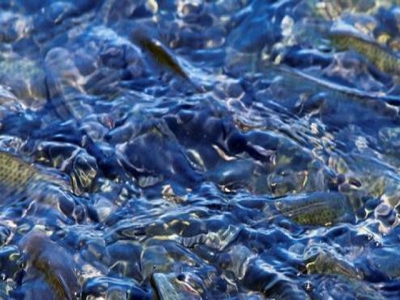Researchers breed strep-resistant tilapia

Around an eighth of the world's tilapia harvest is lost to streptococcosis each year.
Of the $8 billion worth of farmed tilapia produced each year, around $1 billion is lost to streptococcosis, according to the USDA Agricultural Research Service.
The main culprits are two bacteria, Streptococcus agalactiae and S. iniae, but now ARS scientists and industry partners have developed tilapia that are resistant to both.
Strategies to combat streptococcosis are effective, but not without drawbacks. Vaccines and antibiotics are expensive, and using antibiotics raises concerns about antimicrobial resistance.
Benjamin LaFrentz and Craig Shoemaker, molecular biologists at the ARS Aquatic Animal Health Research Unit in Auburn, Alabama, showed that selective breeding for disease resistance is a promising alternative.
Working with Akvaforsk Genetics, a selective breeding company specializing in aquaculture species, and Spring Genetics, a tilapia breeding and distribution company, LaFrentz and Shoemaker evaluated tilapia for resistance to S. iniae and S. agalactiae. They found that crosses between the best performing fish were more resistant to the bacteria than other tilapia.
This milestone research paves the way for developing more lines of tilapia with resistance to other pathogens. Spring Genetics data shows that the improved tilapia lines will save an average-size farm nearly $635,000 a year annually.
Related news
 F3 takes on a new challenge – fish oil alternatives
F3 takes on a new challenge – fish oil alternatives Building off the success and excitement of the fish-free aquaculture feed cash-prize contest that concludes this fall, the F3 Challenge has set its sights
 Prevent disease outbreaks through effective bacterial pathogen control
Prevent disease outbreaks through effective bacterial pathogen control Aquaculture is the fastest growing food-producing industry and is currently playing a major role in global protein production.
 Radical rethink over micronutrient requirements for farmed salmon
Radical rethink over micronutrient requirements for farmed salmon A new study suggests that farmed Atlantic salmon diets should contain four times the levels of niacin and twice the levels of vitamin B-6 compared